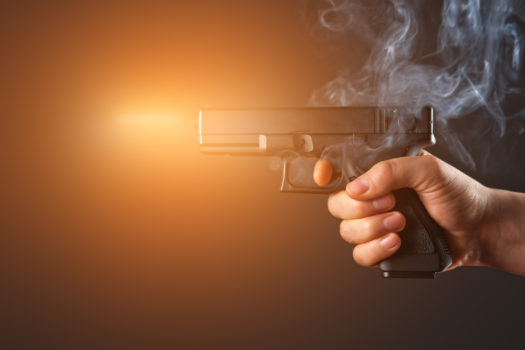
In State v. Kanem Williamson (A-65-19/083979) (Decided May 10, 2021), the Supreme Court of New Jersey affirmed that the trial court correctly admitted the victim’s statement identifying defendant as her shooter as a dying declaration under N.J.R.E. 804(b)(2). The court further held that the admission of the victim’s statement as a dying declaration did not violate the Confrontation Clause of the Sixth Amendment to the United States Constitution or Article I, Paragraph 10 of the New Jersey Constitution.
Facts of State v. Williamson
In 2014, A.B. was shot five times while outside of an apartment complex. After being transported to the hospital, A.B. regained consciousness but was unable to speak because of the breathing tube. A.B.’s attending physician, Dr. Anastasia Kunac, told A.B. that she had been shot several times, her heart had stopped and been restarted, and an injury to her spine left her a quadriplegic and unable to breathe on her own. Dr. Kunac also told A.B. that she could die. Upon learning the nature and severity of her condition, A.B. became visibly upset and started to cry.
After arriving at the scene, Detective Filiberto Padilla and other officers spoke with Kanem Morris, defendant’s father, who told police that defendant had admitted to shooting A.B. and left shortly before police arrived. Another witness also implicated defendant in A.B.’s shooting.
At the hospital, Detective Padilla had a videotaped exchange with A.B., who could communicate only by nodding or shaking her head. Detective Padilla asked whether she knew who shot her; whether she knew where she was at that time; whether she had known the person who shot her for a while; whether the shooter was from the complex; whether the person in the photograph was the person who shot her; whether she had had any arguments with that person that day; and whether she was sure that was the person who shot her. A.B. nodded in the affirmative to all of the questions except about having had an argument; in answer to that question, she shook her head in the negative.
A.B. died eleven months after the shooting. Defendant was indicted for the murder of A.B. and weapons offenses. Before trial, the State moved to admit into evidence, as a dying declaration under N.J.R.E. 804(b)(2), A.B.’s videotaped statement identifying defendant. During an evidentiary hearing on the State’s motion, the trial court heard testimony from one of the paramedics who responded to the scene of A.B.’s shooting, Dr. Kunac, and Detective Padilla. The trial court found all three to be credible, stating they appeared “calm and composed” with “knowledge of the facts to which they testified.” The trial court also found that A.B. was “fully cognizant” of her injuries and “the possibility of her imminent death.” The trial court concluded that A.B.’s statement did not violate the Confrontation Clause and admitted the statement. After a trial, the jury convicted defendant of a lesser included offense of murder and of the weapons charges. The Appellate Division affirmed.
NJ Supreme Court’s Decision in State v. Williamson
The New Jersey Supreme Court affirmed. “We find that the trial court correctly admitted A.B.’s statement identifying defendant as her shooter as a dying declaration under N.J.R.E. 804(b)(2),” Justice Lee Solomon wrote. “We further conclude that the admission of A.B.’s statement as a dying declaration does not violate the Confrontation Clause of the Sixth Amendment to the United States Constitution or Article I, Paragraph 10 of the New Jersey Constitution, and we affirm the Appellate Division’s judgment.”
The New Jersey Supreme Court first addressed whether the trial court abused its discretion by admitting A.B.’s identification of defendant as a dying declaration. As Justice Solomon explained, the dying declaration exception to the rule against hearsay is based on the belief that persons making such statements are highly unlikely to lie. New Jersey has codified the exception in N.J.R.E. 804(b)(2), which states that, “[i]n a criminal proceeding, a statement made by a victim unavailable as a witness is admissible if it was made voluntarily and in good faith and while the declarant believed in the imminence of declarant’s impending death.”
In this case, the New Jersey Supreme Court concluded that the trial court did not abuse its discretion in admitting A.B.’s dying declaration identifying defendant. Justice Solomon wrote:
Considering the totality of the circumstances in determining A.B.’s state of mind at the time of her statement — the words spoken to and acknowledged by A.B., that she cried when told of the gravity of her injuries, that her assailant used a gun to shoot her five times, and that she was a quadriplegic who could not breathe without a breathing tube — A.B.’s identification of defendant was made voluntarily, in good faith, and while she “believed in the imminence of [her own] impending death” with no hope of recovery.
The New Jersey Supreme Court next turned to whether the admission of A.B.’s statement identifying defendant violated his Sixth Amendment right to confrontation. After reviewing Supreme Court precedent regarding exceptions to the Confrontation Clause when a witness is unavailable to testify at trial, the court ultimately concluded that A.B.’s statement is admissible.
While the New Jersey Supreme Court acknowledged that the U.S. Supreme Court has not directly confronted the issue, it found it “likely that should the question arise, the United States Supreme Court will find that the Confrontation Clause is not violated by the admission of dying declarations.” The New Jersey Supreme Court also noted that other jurisdictions have signaled their view that the United States Supreme Court is likely to formally adopt dying declarations as an exception to the Confrontation Clause.
